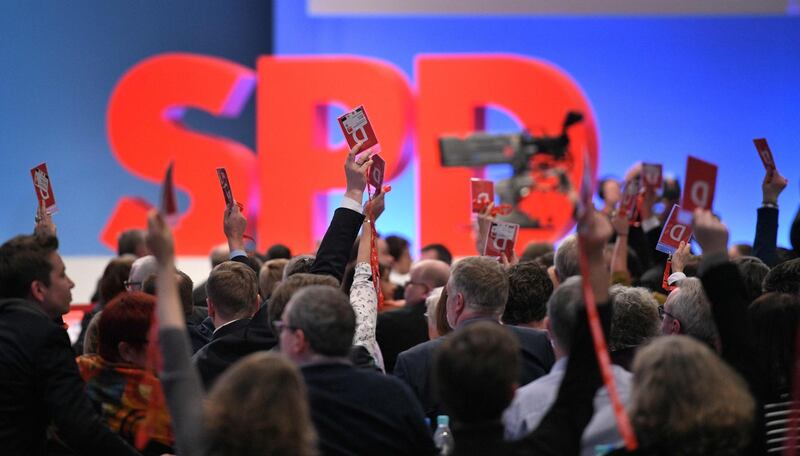Germany's Social Democrats (SPD) voted on Sunday to begin formal coalition talks with Chancellor Angela Merkel's conservatives, moving Europe's economic powerhouse one step closer to a stable government after months of political uncertainty.
SPD delegates voted by 362 'for' to 279 'against' to move ahead with negotiations after the centre-left party's leaders agreed a preliminary coalition blueprint with Ms Merkel's conservative bloc earlier this month. There was one abstention.
Talks are now expected to start this week, bringing relief to Germany's partners in Europe, where Ms Merkel has long played a leading role in economic and security affairs.
Sunday’s convention was the biggest obstacle to Ms Merkel’s plan to govern with the SPD. While the party will give its members the final say over any coalition pact negotiated in the weeks ahead, the vote was the clearest sign yet that a four-month political stalemate is ending and Ms Merkel is moving toward re-inauguration, possibly by mid-March.
_______________
Read more:
[ Angela Merkel strikes coalition deal with promise to limit migration ]
[ German leaders pledge 'new politics' as coalition talks begin ]
_______________
Ahead of the vote, party leader Martin Schulz urged party members to vote for opening the coalition talks with Ms Merkel, saying a stable German government was needed to strengthen Europe and serve as a bulwark against right wing extremism.
The center-left party has governed with Ms Merkel's Union bloc since 2013, but Mr Schulz had vowed not to renew the so-called "grand coalition" after his Social Democrats took a beating in September's election.
He told party members gathered in Bonn that the decision was right at the time — but said the political situation has changed after Ms Merkel failed to form a coalition with two smaller parties.
"Europe is waiting for a Germany that knows its responsibility for Europe and can act decisively," he said.
He said the stakes were high, with French President Emmanuel Macron needing support in his ambitious plans to reform the European Union.
"If he fails in his policies, then it can't be ruled out the extreme right will form the next government in Paris," Mr Schulz said.
If the Social Democrats had rejected entering the talks, the only options left would have been for Ms Merkel to form a minority government or for new elections.
Social Democrat deputy leader Malu Dreyer, the Rhineland-Palatinate governor, told delegates that since Ms Merkel's Union bloc is against forming a minority government, voting against entering talks would mean new elections.
"We can't force the Union into a minority government, that's an illusion," she said.
But the head of the Social Democrats' youth wing, Kevin Kuehnert, urged delegates to vote against the grand coalition anyway, saying agreeing to it just because it's the least-bad option would just contribute further to the party's "crisis of trust" with supporters.
"This loop needs to be broken," said Mr Kuehnert, who has led a strong opposition to opening new coalition talks.
Many Social Democrats have voiced fears that should they become part of a new coalition, that would leave the anti-migrant nationalist Alternative for Germany party as the largest opposition party.
But Mr Schulz said the risks of a new election were even greater.
"Who can say that new elections won't further strengthen the right fringe?" he asked.
He noted that other Social Democrats in Europe hadn't profited from being in opposition, and suggested his party's best chance at regaining support from its grassroots was through vigorously pursuing its policies from within government and not behaving as a "junior partner" to Ms Merkel.
"Any government the SPD takes part in, regardless of what coalition, must be an SPD government," he said. "That has to be our stance."







